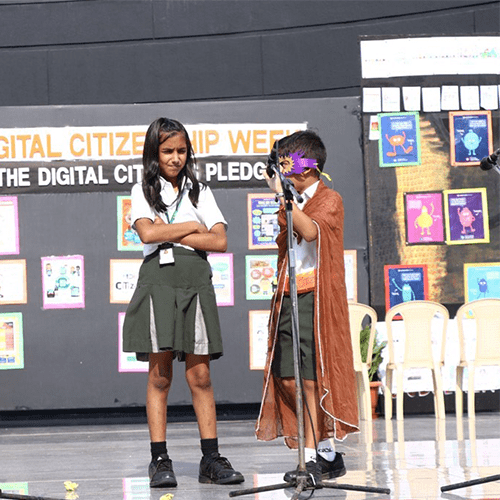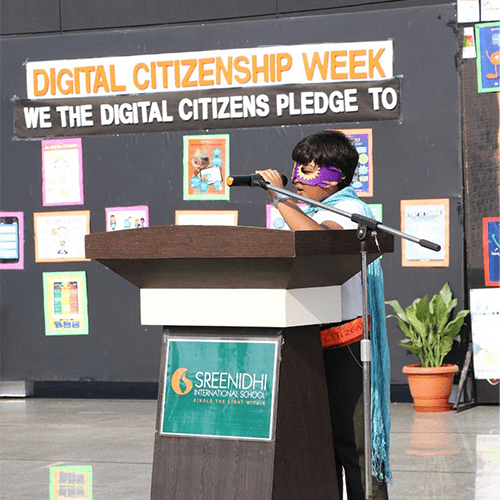Empowering Students: Nurturing Digital Citizenship Skills in an AI Age
Our students are growing up in today’s fast-paced, digital world, with technology as an integral part of their lives. The digital landscape is a playground for exploration and learning, from online education to games and social media. These opportunities, however, come with responsibilities, challenges, and risks. This is where the significance of teaching students digital citizenship skills shines through. In this article, we will look at several key aspects of digital citizenship and why they’re important for our students, including the impact of artificial intelligence (AI).
The responsible and ethical use of technology and the internet is referred to as digital citizenship. It entails a diverse set of skills and values that enable people to navigate the digital world safely, respectfully, and responsibly. These skills are important for students of all ages, but they are especially important for primary students who are just starting to explore the online world.
Developing digital citizenship skills encourages students to consider the information they encounter online critically. They learn to distinguish between trustworthy sources and misinformation, which is especially important in this day and age of fake news and misinformation.
It’s easy for students to forget that there are real people behind the screens in the online world. Teaching them respectful and empathetic communication skills contributes to a more positive online environment. They learn the value of being kind and considerate, whether it’s in a YouTube comment or an email to a classmate.
Why is digital citizenship important for students in the twenty-first century?
Steps to overcome cyberbullying
Cyberbullying is a serious problem in the digital age. It has the potential to hurt, harm, and affect students emotionally as well as academically. Students must learn the following to combat cyberbullying:
1. Recognize the signs of cyberbullying and respond appropriately.
2. It is critical to avoid engaging with cyberbullies and to report incidents to trusted adults.
3. Empathy and kindness can help prevent inappropriate online behaviour.
Digital Footprint and Identity
Every online action leaves a digital footprint—a digital trail of our online activities. Students must realize that their digital footprint can have an impact on their future. They should understand:
1. How to manage their online reputation and present their best selves on the internet
2. The long-term consequences of their actions, such as inappropriate content sharing or cyberbullying,
3. Their digital identities should correspond to their true selves and values
Media Balance:
While technology provides limitless possibilities, it is critical to strike a balance between screen time and offline activities.
1. Setting time limits for digital devices to ensure a healthy lifestyle is important for students.
2. To promote a balanced routine, engage in outdoor activities, hobbies, and reading.
3. Recognizing and dealing with the symptoms of screen addiction.
Private and personal information protection:
Online privacy is a top priority. Students must be educated on how to protect their personal information. They should understand:
1. The significance of not sharing personal information such as addresses, phone numbers, or passwords online
2. How to spot phishing attempts and avoid falling victim to scams
3. The significance of using social media privacy settings
Password Strengthening:
Passwords serve as the first line of defence against online threats. Students should comprehend the significance of creating strong, unique passwords for various online accounts.
1.How to create a password with a combination of letters, numbers, and symbols
2.The importance of never sharing passwords with anyone, including friends.
Pledge of Digital Citizenship:
A digital citizenship pledge can help a student solidify his or her commitment to responsible online behaviour. It reminds them of the values and principles they should uphold. The pledge could include things like:
1. I will be courteous and respectful to others online.
2. I will safeguard my personal information and privacy.
3. I will use technology responsibly and respectfully.
4. I will report any cyberbullying or inappropriate behaviour to a trusted adult.
The Impact of Artificial Intelligence (AI):
AI is becoming more prevalent in today’s digital world. AI technologies can help with research, provide personalized learning experiences, and even automate certain tasks. However, it is critical for students to understand that AI has ethical implications.
1.They should understand how AI algorithms influence the content they see online and the information they receive.
2.The significance of critical thinking when confronted with AI-generated content.
3.The ethical application of AI, including how to avoid plagiarism when using AI-powered writing tools.
Parental Involvement:
Parents play an important role in instilling digital citizenship in their children. They should have conversations about online safety, establish screen time guidelines, and monitor their child’s online activities.
Responsible digital behaviour should be modelled by teachers and parents. Because children often learn by example, adults should model positive online behaviour.
Future Planning: In our increasingly digital world, digital citizenship skills are essential life skills. Teaching them at a young age helps students prepare for their future academic and professional pursuits.
In today’s digitally-driven world, developing digital citizenship skills in students is not only important but also necessary. These abilities enable young learners to navigate the online world responsibly and ethically, ensuring their safety and well-being. We can help shape a generation of responsible digital citizens who will contribute positively to the online community and thrive in the digital age by instilling these values at a young age.








Author Name : Kiranmai Pratapa
